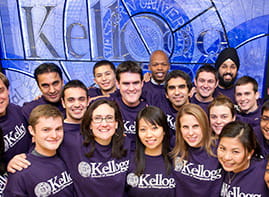Nigerian health minister offers his government’s vision for delivering quality care
10/17/2016 - The wealth of a nation depends on the health of its people. Delivering a talk on “Elevating the Quality of and Access to Healthcare in Africa” at Kellogg’s Jacobs Center on October 7, Nigeria’s Honourable Minister of Health Isaac F. Adewole, shared his country’s ambitious plan to implement universal health coverage by 2018.
Nigeria enjoys the fastest growing economy in Africa, with a rising middle class. Yet this most populous nation on the African continent experiences high infant and maternal mortality coupled with high birth rates especially among the impoverished. Average life expectancy tops about 55 compared with 80 years of age in more affluent, developed countries. Improving these health indicators is a mandate of the Nigerian government, according to Minister Adewole, a professor of obstetrics and gynecology at the University of Ibadan in Nigeria as well as an adjunct professor at Northwestern University Feinberg School of Medicine’s Center for Global Health.
“Similar to the United States, we have a strong national assembly and president who recognizes health care is an important issue,” he said. Improving Nigeria’s fragile health system is one way to contribute to further and future development in Africa as a whole. Added Professor Adewole, “While we may have limited resources on the surface, Africa is one of the richest continents in the world.” He encouraged the audience of Kellogg students and faculty to consider the investment opportunities in what he described as the “continent of the future.”
Nigeria’s health care overhaul calls for opening 10,000 clinical facilities to provide basic essential health care to about 100 million Nigerians. By providing accessible, affordable and quality primary care upfront, the government hopes to address high fertility rates by improving access to contraceptives and save more lives of children and mothers via better prenatal care and nutrition education. Improved national immunization coverage will help eradicate communicable diseases such as polio. Currently Africa is short some one million qualified health care workers. As a result, shifting health care duties traditionally performed by physicians to trained nurses and community health care workers remains a critical element.
Achieving universal coverage will require significant investment from the public sector: at least 50 percent in public expenditures, according to Professor Adewole. The Nigerian government also sees partnerships with the private sector as critical to its health care plan.
Africa is home to the fastest growing healthcare markets in the world and Nigeria, for example, will be the third largest country in the world by the year 2050. As such, business students interested in healthcare careers will benefit from a stronger understanding of these challenging yet rewarding markets. A panel of three Kellogg alumni shared how they are already using their MBAs to support the health needs in Africa:
- Varsay Sirleaf ’10, is a Director and CEO of the Snapper Hill Clinic, Limited, the largest, private, outpatient facility in Monrovia, Liberia. Sirleaf has employed his Kellogg skills to improve efficiencies at the Clinic such as introducing technology to digitize the patient experience and establishing international quality standard to ensure positive health outcomes. His Kellogg experience is helping him manage the Clinic’s growth as it scales to two additional locations and introduces imaging, maternity and minor surgical services.
- Nikki Tyler ’13 is as a market access advisor at the U.S. Agency for International Development’s (USAID’s) Center for Accelerating Innovation and Impact (CII). In this role, she focuses on the development and implementation of market-based strategies to accelerate adoption of priority health products. Over the last year, under the leadership of the Nigerian Ministry of Health, she, along with partners such as MCSP, CHAI, and Dalberg Global Development Advisors, developed a scale-up strategy for chlorhexidine. Chlorhexidine is an antiseptic that, when applied to the umbilical cord in high-risk settings, has been shown to reduce neonatal mortality by 23 percent.
- David Milestone ’07, deputy director of USAID’s CII, has used his Kellogg background in a variety of ways, from supporting scale-up of priority health products to developing partnerships with the private sector, like the Aspen Management Partnership for Health (AMP Health). There’s a place for more “business-minded thinking” that can be applied to social issues, he said.
At the event, Executive Director of Kellogg’s Global Health Initiative Kara Palamountain announced the launch of a new Kellogg case study, which details the work of Nigeria’s Ministry of Health and other partners, including USAID. “Nigeria is now Africa’s largest country, both in terms of population and economy. As the government works to strengthen primary care, the private sector has a unique opportunity to design and deliver cost effective and innovative medical products and services. Kellogg students and faculty recently wrote a case on one of these innovative products—chlorhexidine—which helps prevent deaths in newborns. This case was an opportunity for Kellogg to explore how private sector products are rolled out in Nigeria’s healthcare system.”






